Ex-Ithaca football star Brady Hessbrook ended his life, but family carries on his legacy
ITHACA — Kristy Hessbrook was pleasantly surprised when the garage door opened and she saw the car belonging to her son, Brady, sitting in the garage.
She found it curious since he didn’t have a garage door opener and normally parked on the side of the driveway.
She thought Brady, a 20-year-old sophomore at Wayne State, had come home to surprise them and a good day was about to become even better.
Because of an overnight snowstorm, there was a three-hour delay to the start of the school day on Jan. 27 and Kristy, 52, had been in school from only 11 a.m.-3 p.m.
“It was such a short school day,” she said. “I specifically remember telling my aide that day: ‘This was the best day ever.’”
That was about to change.
Kristy entered the house hollering Brady’s name. She jumped over the cat and ran upstairs to see the youngest of their two children.
When his bed was empty, Kristy figured he was taking a nap in the basement, which wasn’t unusual.
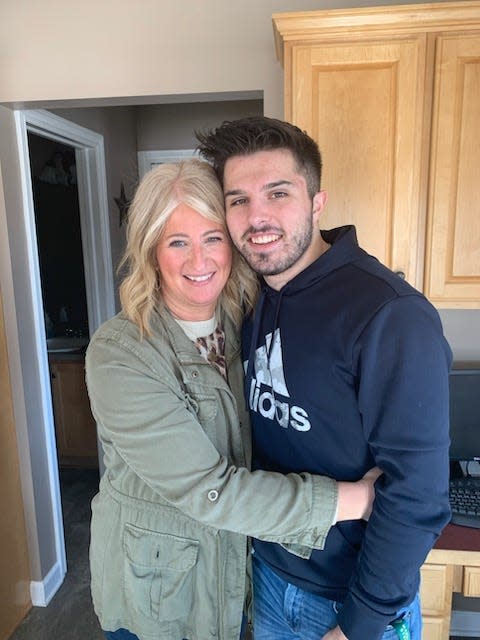
She didn’t see Brady as she hurried down the basement steps, but noticed that the bathroom door was closed. Then she turned around and saw the gun case for the hunting rifle was empty and it was as if someone took a baseball bat and slammed her in the gut.
“Brady, you’re scaring me!” she screamed when she found the bathroom door locked.
She raced to the garage and grabbed a tire iron and began hammering the doorknob.
“I could have hit it a lot harder,” she said, “but I didn’t.”
She picked up her phone and called her husband: “You’ve got to get home,” she yelled.
Terry Hessbrook could tell by the despair in her voice something was drastically wrong.
“On my way,” Terry responded as he literally ran out the door.
The Hessbrooks live less than two blocks from the school, and Terry was home in a flash.
He sent Kristy upstairs and then broke down the bathroom door.
“Call 9-1-1,” he said.
Kristy was crying and shaking as she grabbed for her phone.
“I could barely get 9-1-1 to dial,” she said.
That is when the never-ending nightmare began.
“It’s hell; it’s hell every day,” said Terry, 55. “We both cry ourselves to sleep and we both cry when we both wake up.”
Help born out of the sorrow
There seems to be a continuous supply of sorrow for them and it takes a major effort for them to get through each day.
They had no idea their son suffered with anxiety and depression, which led to his unexpected suicide. If there were signs, they missed them.
But the Hessbrooks are determined to keep their son’s memory alive and try to make something positive out of this unspeakable tragedy, if that is even possible.
A 2021 study by the Center for Disease Control and Prevention revealed that 22% of high school students considered suicide in the past year, with 18% saying they made a suicide plan and 10% admitting they attempted suicide at least once.
The search for an action plan began a few days after Brady’s death. The Hessbrooks were staying with the family of Terry’s brother, Todd, who lives a block away in the same subdivision.
Alli Walden has been Brady’s girlfriend for nearly five years and she was with the family for days after his death.
Her older brother, Caleb, a graphic designer with the University of Michigan athletic department, was at Todd’s house when Terry began spitballing ideas for a possible foundation revolving around Brady.
Many people called him “B” and he wore jersey No. 4 at Ithaca. Terry put the two together and came up the word “before.”
“Before you do something, you need to talk to someone,” Terry blurted out. “I started throwing these things out and people jumped on board.”
He asked Caleb if he could do something with that, and he replied: “I’ll have something for you tomorrow.”
Caleb used a picture of Brady walking away along railroad tracks, tossing a football in the air. In place of the laces on the football Caleb inserted a semicolon.
The semicolon has become a popular tattoo. To many it represents struggles with mental health and the importance of suicide prevention. It can also be a symbol that your story isn’t finished.
Prominent in the logo is “B4” with the numerical sign within the “B.” In the letter “D” of the word “FOUNDATION” is a cross.
“Brady was very strong in his faith; he read the Bible,” said his father. “It was importation in ‘foundation’ there was a cross.”
That is the genesis of the B#4 Foundation (theB4foundation.org) that seems to be gaining steam as the months pass.
The foundation is selling shirts, hoodies and other paraphernalia. Last spring, they awarded two $2,000 scholarships to Ithaca students. Next spring, the plan is to award two $2,000 scholarships at all six schools in Gratiot County.
“I think one of the reasons the B#4 Foundation has taken off and has so much popularity is that everybody can see a little bit of Brady in their kid,” Terry said. “He was just a normal kid. He was a college kid; had a job, had a car, had a girlfriend, had plans, had goals, had faith.
“He had everything that any of us would want. And if it can happen to him, then I think people think it can happen to any one of us.”
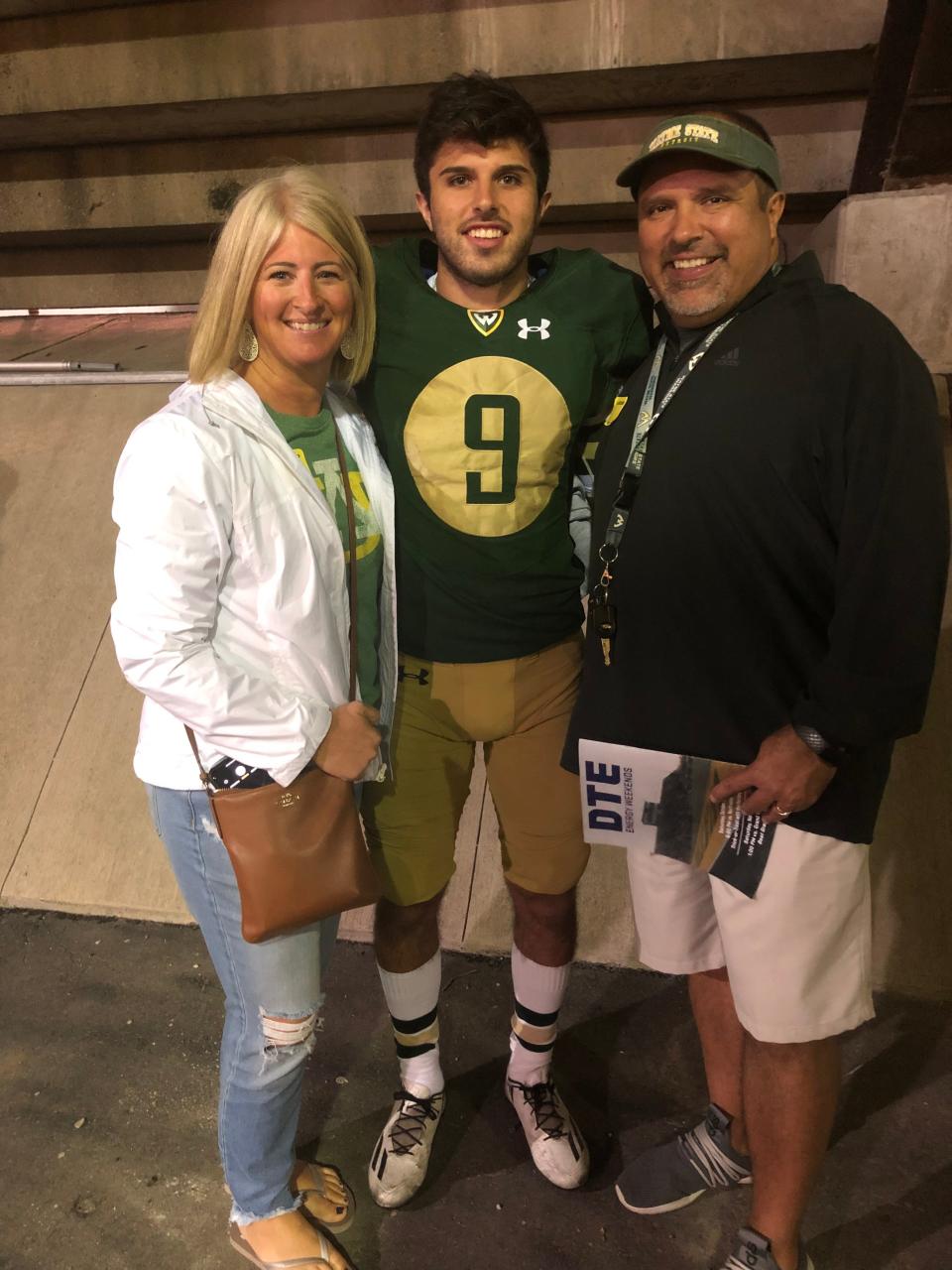
The coach's son makes a community proud
That is why people in this community along US-127 between Lansing and Mount Pleasant were so stunned when they learned of the suicide.
Pick a kid — any kid — and they would seem a more likely candidate for something like this than Brady (whose given name was Braden — he actually wasn’t named after Tom Brady, as many assumed).
This Brady was the All-America boy, too, as well as an honors student. He was the all-state quarterback for the sensational teams his father coached.
He was part of the family that brought greatness to a school in mid-Michigan where you can take about 45 steps outside the door near the superintendent’s office and be in a cornfield.
Terry was an all-state running back at Ithaca and then played for Glen Stevenson at Olivet College.
At the 1987 banquet following Hessbrook’s junior season, Stevenson announced he was stepping down as coach. Before he finished speaking, Hessbrook was at Stevenson’s table, asking his daughter, Kristy, for a date.
She was a senior in high school.
“He wasn’t happy about it at first, but he came around,” Kristy said of her father. “He knew he was a good guy, but he just didn’t like the whole age thing.”
Eventually, Stevenson relented, and soon Kristy and Hessbrook were a couple.
“Now,” Terry said, “he’s basically been my best friend.”
Hessbrook’s first coaching job was at Blanchard Montabella from 1991-95. He was anything but successful, sporting a 2-43 record.
He claims he still apologizes to every former Montabella player he sees.
“I didn’t know what I didn’t know and it was painfully obvious,” he said. “It was my first five years of coaching and I figured I’d never coach again.”
He was laid off from his teaching position in 1996, but landed one at his alma mater.
There were no paid coaching position open on the football staff, but he served as a volunteer defensive back coach under his high school coach, Jim Ahern.
In the spring of 2004 Ahern took a coaching job in Florida and Hessbrook — surprisingly — was named head coach. Besides his time as an assistant at Ithaca, the only thing on his résumé was the 2-43 record at Montabella.
“I became head coach with that sparkling record,” he said, laughing and shaking his head at the absurdity of it all. “The school board members should have all been recalled, probably.”
Brady was born on Aug. 19, 2002, and after he turned 2, he never missed an Ithaca game.
There are pictures of him with the team as a waterboy, a ball boy and the manager before finally getting his chance to play, first as a starting defensive back and backup quarterback his freshman year.
He grew up playing games in the backyard with his older sister, Kelsey, now an acquisition specialist for E.G. Workforce Solutions in Battle Creek.
The agreement was Kelsey would play football with Brady and then he would play soccer with her.
“That was always the deal,” she said. “We usually didn’t make it to soccer. It seemed like we played every sport outside together. Those are some of my favorite memories.”
Kelsey enrolled at Grand Valley State as a freshman, but was soon at nearby Central Michigan.
“I loved Grand Valley, but it was a little far at the time,” she said. “I wanted to be closer to the family and I didn’t want to miss Brady’s games. That was definitely a big factor in me transferring to CMU. Once I moved back, I don’t think I missed any of his games.”
In Hessbrook’s 17-season tenure, Ithaca won five state championships and was runner-up twice, amassing a sensational 177-25 record and earning the reputation as one of the state’s most outstanding coaches.
Ithaca owns the state’s second longest winning streak: 69 games — three short of Hudson’s record 72.
Brady began playing football in the fifth grade and wanted to be a quarterback, while his father urged him to be a running back.
“He told me in our offense he can do both,” his father said. “He had it figured out way before I did. He took right to the game. He was always a big, strong, agile kid who could run around and do things. It was a perfect fit.”
He won the quarterback job in his sophomore year, but in Week 5 tore his ACL, ending his season.
The next year, while diving for a tipped pass he separated his right shoulder. It didn't require surgery, but hampered his ability to throw and required hours and hours of physical therapy.
“I think that was the start,” Kristy said. “He stopped sleeping at that point. He had sleeping issues. It was the pain, but he never told us.”
His senior season — 2020 — was the one dominated by COVID-19, but he still had an outstanding campaign, passing for over 3,000 yards and 30 touchdowns and earning Free Press Division 7 All-State honors.
Brady signed with Division II Wayne State, and after 17 seasons Terry stepped down from coaching to attend WSU games, even when Brady was being redshirted.
Alli followed Brady down to the Detroit area and enrolled at Chamberlain University, a nursing school in Troy. The Hessbrooks were delighted.
“She was a great girl for him,” Kristy said. “She was the love of his life. When they took his laptop, he had sticky notes on it of baby names. They had already started talking about baby names. He had plans for a future.
"That’s the hard thing.”
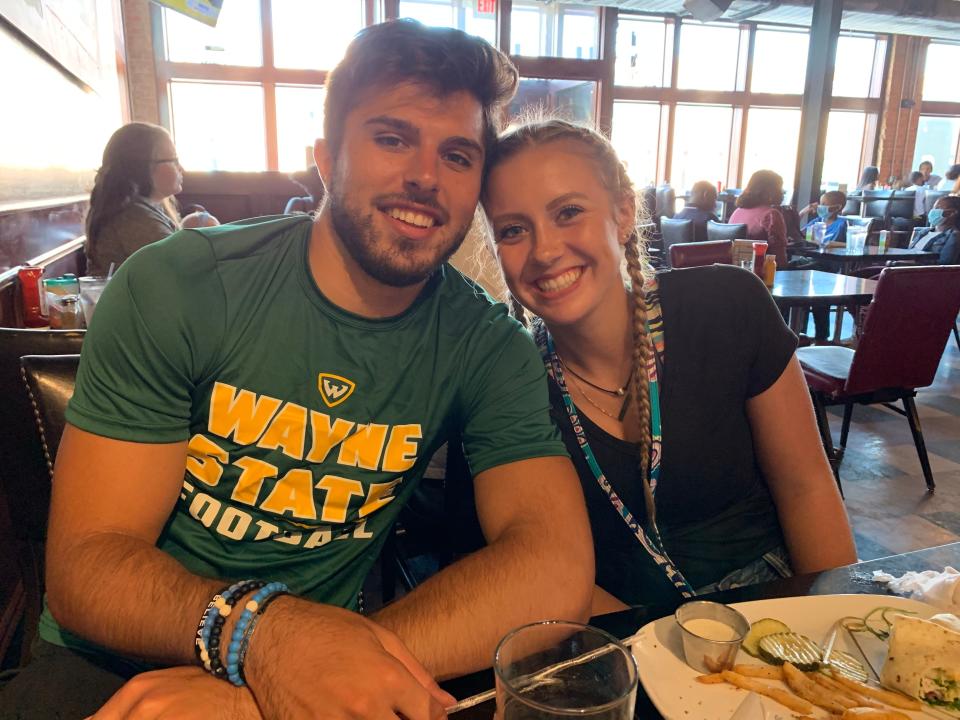
'He loved everybody'
Alli’s mother works at a dentist’s office in Ithaca and mentioned to Alli, who attended nearby Fulton-Middleton, that she and Brady and would make a good couple.
In the summer of 2019, Brady messaged her on Instagram and began a conversation. That led to a meeting at an Ithaca seven-on-seven, which led to a second meeting at an all-day seven-on-seven at Alma College.
“Terry came over and said, they’re usually trying to get out of this,” Alli said. “He asked: ‘Why are you signing yourself up for this?’ ”
She signed herself up for the whole ball of wax.
They discovered that they had a lot in common and were soon a couple.
On Jan. 27, Alli was in Fulton, waiting for Brady. She had been texting him, but didn’t receive a reply.
Eventually, Terry called her and told her he had terrible news and she needed to sit down.
“Brady’s gone,” he said, and she dropped her phone.
She remembers little of the next few days.
“I spoke at Brady’s funeral,” she said, “and I don’t remember it at all.”
Alli does remember why she initially fell in love with him and how he made her feel.
“He was super-caring,” she said. “He loved everybody, but especially the way he treated my family. Avery, my sister, calls him her hero. He would do anything for anybody. I’m very family oriented and just the way he treated my family and other people that were important to me was immediately one of the biggest things I liked about him.”
Alli said she suffers from some of the same issues Brady did. They often talked about how they felt and their ongoing struggles.
“I wasn’t doing that well in January, either,” she said. “I would say maybe if I was doing a little better, I would have noticed more. I would have thought he was doing better in the past year than he was doing freshman year of college.”
Brady injured his shoulder again before his sophomore year at Wayne State and, in the summer, decided to give up football. Initially his father was not pleased, but was thankful he was going to stay and earn his degree.
“I knew that football was not good for him,” Alli said. “I know it went from ‘I want to do this for the rest of my life,’ to ‘I have absolutely no interest.’ “
Alli spends much of her time these days at the Hessbrooks because they have become her family, too. She experiences a range of emotions when he she thinks of what Brady did on Jan 27.
How could he do this to her? How could he do this to her family? Or his family?
But Alli also understands how it could have been possible.
“I get super mad and frustrated about it, but also because I have mental health issues,” she said, “I can understand where his head space was at. I love my family so much and still, at the end of the day, if I’m at that point Brady was at that wouldn’t be enough, just loving my family that much.
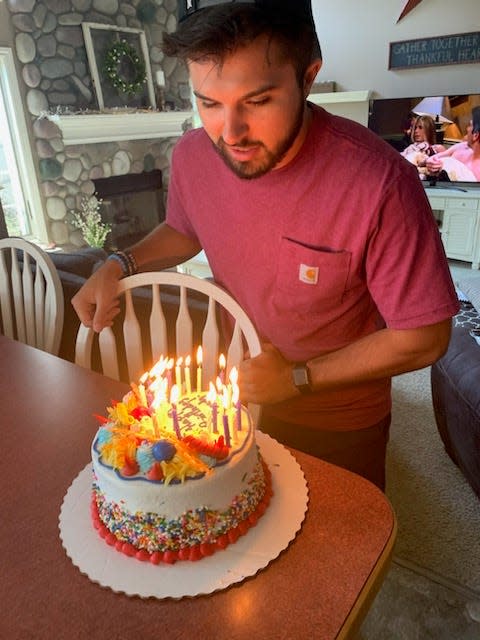
“If I can love them all that much and still think that way, I can understand where Brady was at.”
She appreciates that Brady took off the necklace she had bought him and placed it on his phone before he went into the basement that day.
“That made me think he thought of me enough,” Alli said, “but when it gets to that point, I don’t really feel like ... I don’t know.”
'The worst 30-second phone call of my life'
Brody Dalton played at Jackson Lumen Christi and he, too, signed with Wayne State after making the Free Press’ Division 7 All-State team.
He noticed that Brady had also signed at Wayne State, but wasn’t necessarily looking forward to meeting the guy he had read about.
He first spotted Brady at their opening practice and tried to avoid him.
“Oh crap, that’s Brady the quarterback,” Dalton thought. "He’s too cool for us. He’s from Ithaca, they’re always winning state championships. He’s like the cool quarterback."
Since he didn’t know anyone else, Dalton reluctantly approached Brady and introduced himself. He quickly learned his preconceived thoughts on Brady could not have been more incorrect.
“Instantly, as soon as I started talking to him, I realized he’s the most humble, coolest kid that I’ve ever met,” Dalton said. “From there on, we were best friends. I was in his room every day. He was in my room every day and we were hanging out every single day. We were neighbors and from there, it went to roommates the following year.”
Dalton found Brady to be compassionate and understanding, but not judgmental.
"He was everything you were looking for in a best friend. He was someone that I could always talk to if I was ever going through something,” Dalton said. “He helped me through a lot. He always had a smile on his face and there was always a smile on everyone’s face around him.
“There wasn’t a single person in this world you could talk to that wouldn’t say Brady was the greatest person they ever met.”
Dalton saw no indication that Brady was having depression or anxiety issues in late January. He seemed like good old Brady.
“The night before we had some friends from the team in our room and we were laughing and joking around,” he said. “Everything was completely normal.”
The morning of Jan. 27, Dalton couldn’t locate Brady so he texted him. There was no reply and it was unusual for him not to hear back from Brady.
As morning turned to afternoon and then evening, Dalton had a feeling something was wrong. By 8 p.m. there was no word and he tried calling Alli, but to no avail.
He contacted Brady’s roommate from the year before, but he hadn’t heard anything, either. The former roommate eventually reached Alli and then called Dalton.
“It was the worst 30-second phone call in my life,” Dalton said. “It was literally like having a brother that you were told you’re never going to see again.
“I just kind of froze and didn’t know what to think or how to process anything.”
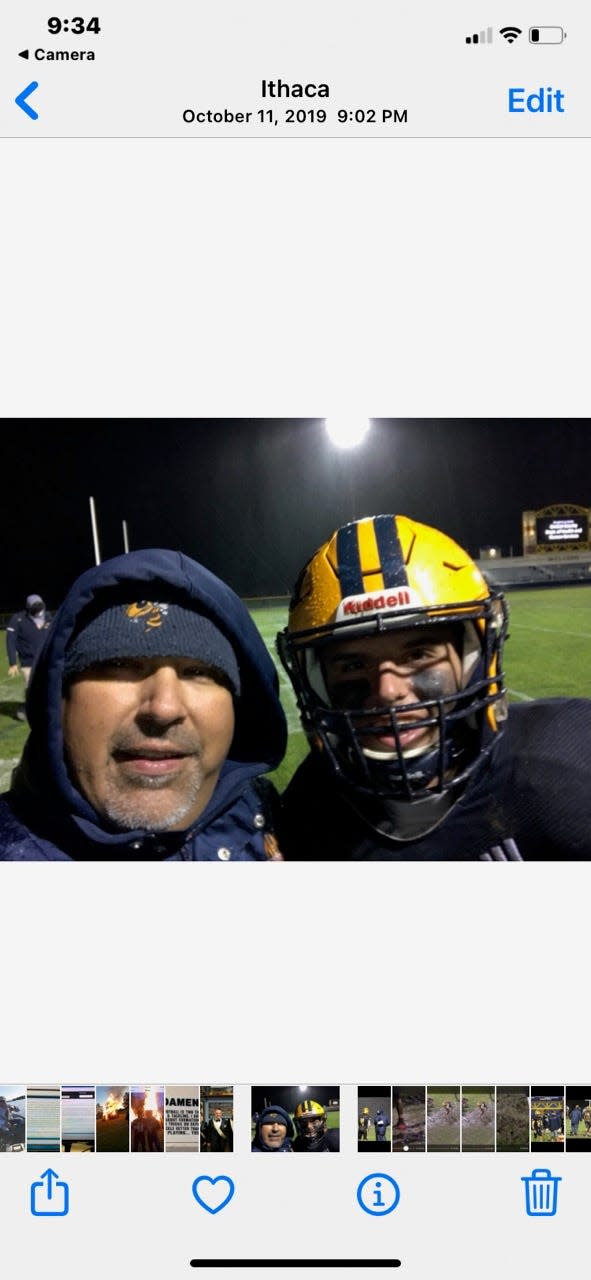
Kelsey was surprised to receive a call from her father on her way home from work on Jan. 27. His news sent her for a loop.
“He doesn’t call out of the blue,” she said. “At that point, I didn’t know much at all. I had about a million questions running through my head at the time.”
Like her parents, Kelsey is searching for answers that just won’t come. How could this have happened to her little brother who was her constant companion through childhood?
“He just always had a smile on his face,” she said. “He had a way to make people laugh that I don’t think I’ve ever seen anybody else make people the way he could.
“He was a carefree-type person, go with the flow, laid-back. He seemed to be happy around everybody.”
Kelsey is seeing a therapist, which seems to be helping. But that only goes so far. She can’t come to grips with the fact she will never see her brother again.
“Some days are better than others,” she said. “It’s just trying to stay busy and put my energy into positive things. Brady was the kindest person, so trying to live on that legacy is that’s how I hope people remember him. He was just the best person.”
The entire mess caught Dalton off guard. Of all people, Brady didn’t seem like the type to take his own life.
“He had mentioned to me earlier in the year that he had suffered from anxiety because I had been going through a little bit of anxiety and it was my first time experiencing it,” Dalton said. “He told me he had experience with it and basically he learned some good tips to deal with it and he helped me through it.
“So I knew he had anxiety, but I didn’t know to the extent.”
Paying respects to a fallen teammate
Dalton was a pallbearer at the funeral; he approached the Hessbrooks before the mass and mentioned that the team was almost there.
The Hessbrooks asked what team he was referring to, and he said the Wayne State football team.
Tyrone Wheatley was named head coach the day before Brady’s death, and they had never met. By then, Brady hadn’t been on the team for months.
But there the Warriors were, getting off a chartered bus and walking single file to hug the Hessbrooks and tell them how much Brady meant to them.
As the casket was loaded into the hearse, the players sang the Wayne State fight song.
The Hessbrooks were blown away by what Wheatley did that day, so soon after getting the job.
“Here’s Tyrone Wheatley, he gets on that bus, he didn’t know half those guys, there’s no way,” Terry said. “He rides two hours, sits through a two-hour funeral and rides two hours back home. And Brady’s not even a member of the football program.”
A few weeks later when they went to Detroit to clean out Brady’s apartment, they went to the football office to thank Wheatley.
Terry told him that he definitely didn’t have to make that trip.
“Yes, I did; I had to do that,” Wheatley said. “Because I could see it in my guys’ eyes. They were hurting.”
In May, the Hessbrooks received a text from Wheatley, who was in Colorado at the time:
“Hey, I’m thinking of you and your family today.”
Again, the Hessbrooks were knocked out.
“Hey,” Terry said, “this guy gets it.”
Wayne State athletic director Erika Wallace recently hired the school’s first assistant athletic director for mental health awareness who will deal strictly with athletes.
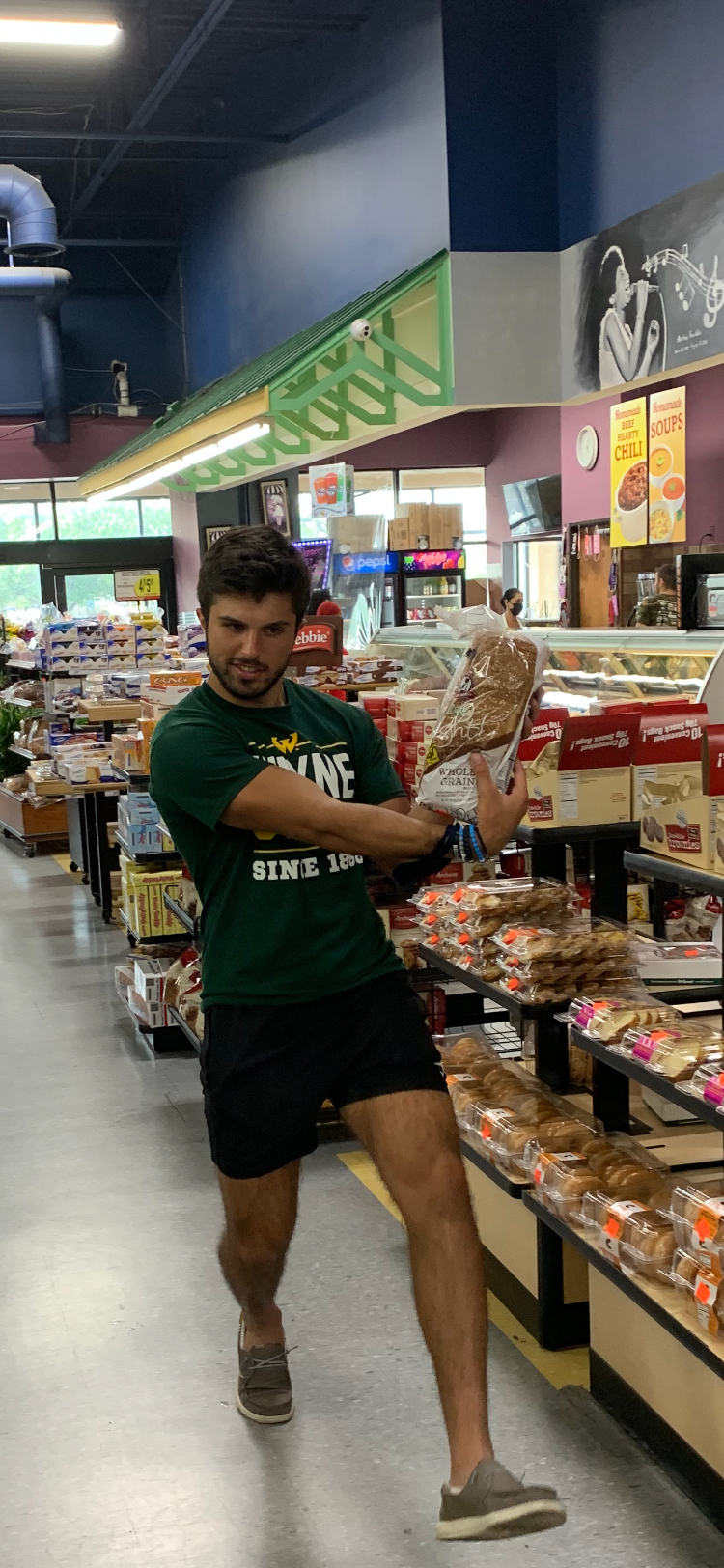
'This huge black cloud'
Jeff Olson is the former football coach at Ishpeming, who won three state championships. In 2012, his 19-year-old son, Daniel, committed suicide.
Olson and his wife visited the Hessbrooks a couple of times, and they have spoken many times. He knows exactly what they are going through.
“They’re still struggling,” he said. “It’s been six months, but they’re still early in the process. It’s different for everybody. We’re telling them to take their time, but at some point — at some point — you have to return to some normalcy.
“At some point, you’ll be able to understand that you do have blessings in your life. They don’t see them now because they have this huge black cloud over them.”
Over the past few years, Olson has become a spokesperson for those trying to deal with youngsters with mental illness.
He has spoken at over 100 high schools in the Midwest and at many community gatherings and at hospitals and colleges.
The first issue, he says, is to identify the problem.
“The dialogue is this is a very common medical issue with a lot of stigmas attached to it,” Olson said. “I don’t like the words ‘mental illness’ because when you or I say ‘mental illness,’ that’s when people freak out and say, ‘You’re crazy,’ or, ‘You’re weak and can’t handle everyday life.’ “
Olson tries to set aside those stigmas and attack the issue head-on. He hopes to help people understand what is really going on here.
“We really need to call it what it is: an illness of the brain,” he said. “It’s different for everybody, but there are a lot of symptoms that people don’t talk about. It’s hard for someone who’s struggling, especially a great athlete like Brady or anybody to come out and say: ‘You know what? I’m sad all the time,’ because they’re going to get judged.”
The common response people give to that statement is "just snap out of it," which is infinitely easier said than done.
“Well, you can’t snap out of medical illness,” Olson said. “There’s actual things in your brain and the connections are off so those thoughts aren’t getting out of that part of your brain that has to do with reasoning and things like that.”
Because of his son’s death, Olson has a keen insight to some of the issues youngsters are facing.
“There’s something that Daniel said and he told his girlfriend, too,” Olson said. “He said: ‘No matter what I’ll do, no matter what I say, nobody will be able to understand what I’m going through.’
“So I’m Daniel’s voice to tell people what he couldn’t say.”
'I just want to remember him as a good kid'
The state police has a task force that deals with young suicide victims.
There was no note left behind, but the police took Brady’s phone and his computer and went through everything, which concerned Kristy.
“I remember thinking,” she said, “ 'If he did something bad, I don’t want to know.' ”
Terry wanted to know everything. He had to.
He told them they wouldn’t have to tell Kristy, but he wanted to know if there was something they could identify that drove him to this.
Did he have a gambling problem and got in over his head? Was he being blackmailed?
“The police came back and said they had done hundreds of these and your kid is absolutely the best kid we’ve ever looked into,” Terry said. “They said there’s no porn on his computer, there were no pictures of girls. He never said anything bad about you or his sister or anybody.”
That conclusion reassured Kristy that Brady was everything she knew him to be, which included being more than just a football player.
“I just want to remember him as a good kid,” she said. “He was such a sweet soul. He was very empathetic about others. If he saw a turtle trying to cross the road, he’d pull over, get out of his car and move the turtle to the other side.”
That empathy extended through every aspect of his life, which his parents have learned since his death.
He was able to leave his mark at Wayne State.
“I had two teammates from Wayne State come to me and say they wouldn’t be here it if wasn’t for Brady,” Terry said. “They said he helped them through some dark times and he was there for only a year and a half.
“The thing that was really evident was the impact he had on others, not just football. In a way, that makes you feel good, because your son was a good person.”
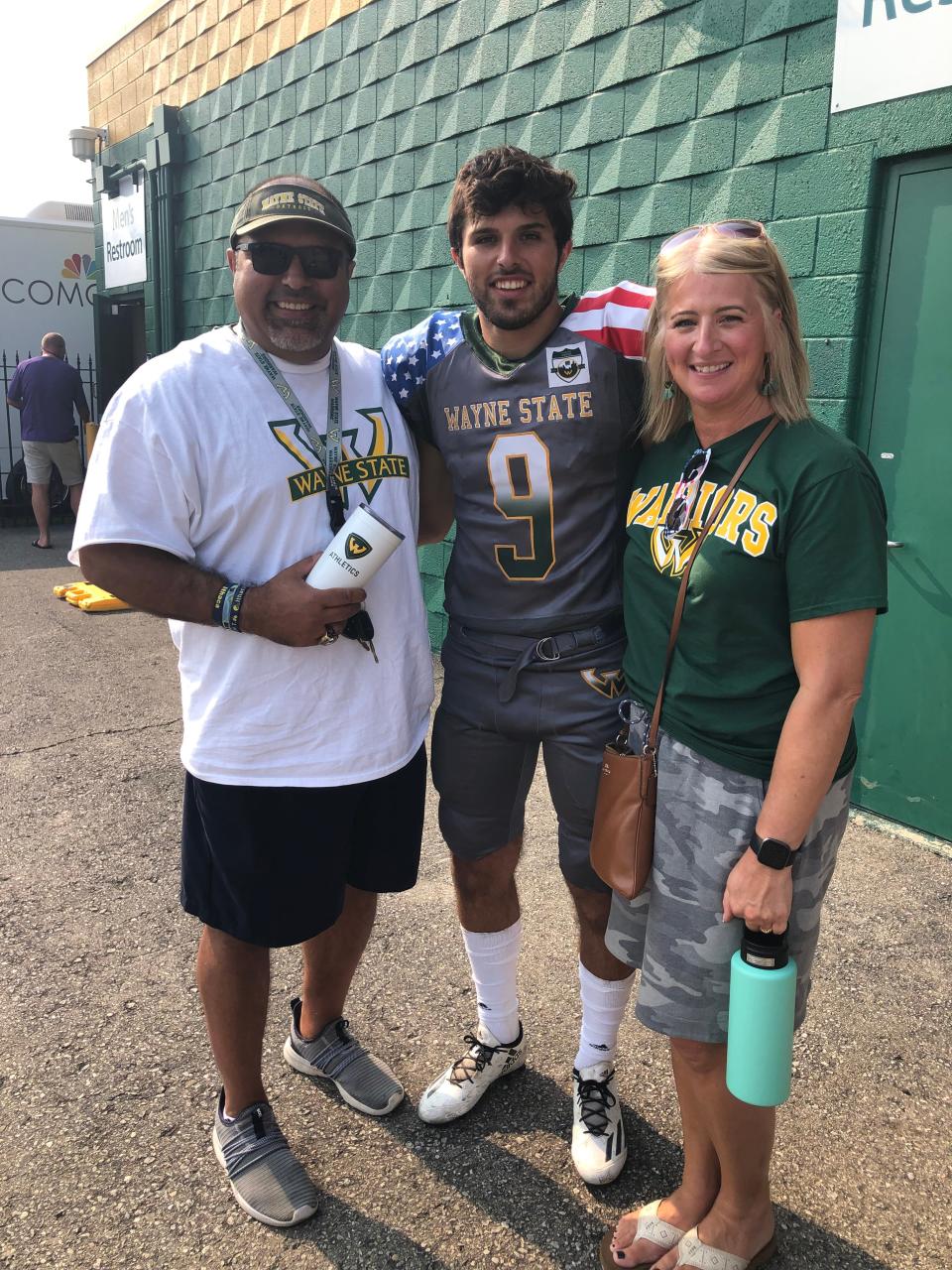
The main thing the Hessbrooks want is to raise awareness of mental health issues. They are encouraging parents to take the initiative if they suspect something is wrong with their child.
One mid-Michigan parent, after hearing about Brady, went through her son’s phone and, sure enough, he was making plans to end his life.
“She swears to me that her son is alive because of Brady,” Terry said. “It gives me chills to talk about. It’s sad because why didn’t ...
"But in a way, at least we’re helping somebody.”
The lasting impact
There are so many unknown aspects to this. The Hessbrooks are left wondering why Brady never reached out to them or anyone else who could have helped.
While the Hessbrooks were in Florida with Kristy’s parents over Super Bowl weekend, they had the basement remodeled.
They seriously considered moving, with Terry contemplating taking a coaching job at a school a couple of hours away from Ithaca.
But each Sunday, they visit the cemetery; they really didn’t want to leave the community that has treated them so well since the tragedy.
“I saw the outpouring from the community,” he said. “The dumbest thing we could ever do is to move away from here. This is where our support system is, the people that love us and care about us.
“This is where our memories of Brady are. What pieces we can hang on to are here, so now we’ll probably never leave this house.”
For the rest of their lives the Hessbrooks will ask themselves the unanswerable question of why they didn't see this coming.
Something Olson said hit home with the Hessbrooks.
“The way Jeff explains it gives us some comfort, in that it’s a disease, he was sick,” Terry said. “He had something in his brain that didn’t allow him to maybe enjoy things.”
Something that nags at the Hessbrooks is that they many have missed signs that could have alerted them to Brady’s troubles.
“You can’t see it,” Kristy said. “If you have a broken leg you see it, you treat it. You can’t necessarily someone who is suffering mentally, especially if they were good at hiding it.”
They both had good relationships with Brady and they all spoke often. They were blindsided by this tragedy.
“Brady wore a mask,” Terry said. “What we want people to know is you’ve got to talk to your kids. You’ve got to make sure people understand that it’s OK if things aren’t going well; that’s normal. Sometimes you struggle.”
The Hessbrooks know all about struggling. It dominates their lives.
But there are moments here and there when they can smile and talk about Brady.
“When I’m wearing that shirt, people stop me and ask me what that shirt means,” Terry said about a foundation shirt. “I get a chance to tell a story. I get to tell Brady’s story. To me that’s a positive thing that helps me.”
Last spring, Ithaca hosted a variety of sporting events, and as the school’s athletic director, Terry was always front and center.
He was able to see firsthand how popular the B#4 movement was becoming.
“We’d have invitationals with teams from all over the place and all these kids are coming in with B#4 shirts on and I’d laugh ... and then I’d almost cry,” Terry said. “That’s really cool, but it sucks that it exists because we could have the B#4 Foundation with Brady still here leading and telling his story.”
Now that story is left for others, like his parents, to tell.
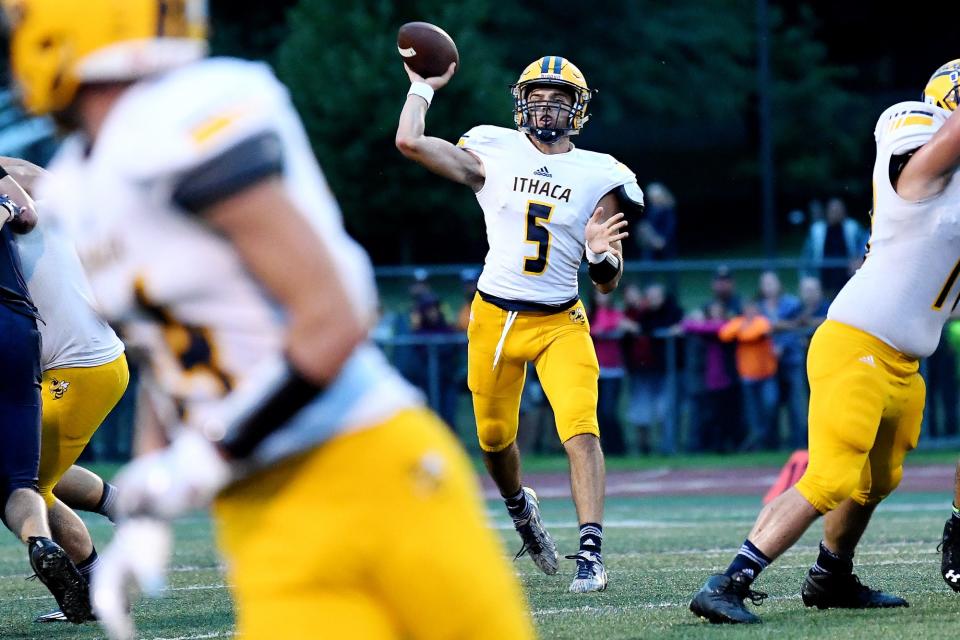
They tell his story and their main message begins with a catchphrase from one of the foundation’s posters: “B#4 you give up, stop and reach out!”
“People have to understand it’s OK to talk about things,” Terry said. “If things aren’t going well, tell someone because somebody loves you, somebody cares about you, somebody needs you here.”
Mick McCabe is a former longtime columnist for the Detroit Free Press. Contact him at mick.mccabe11@gmail.com. Follow him on Twitter @mickmccabe1.
If you or someone you know may be struggling with suicidal thoughts you can call the U.S. National Suicide Prevention Lifeline at 800-273-TALK (8255) any time of day or night or chat online.
This article originally appeared on Detroit Free Press: Ex-Ithaca QB Brady Hessbrook's legacy carried on by mourning family

